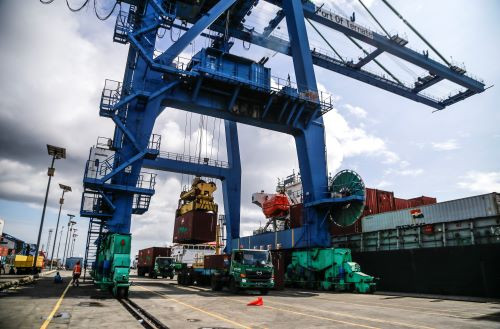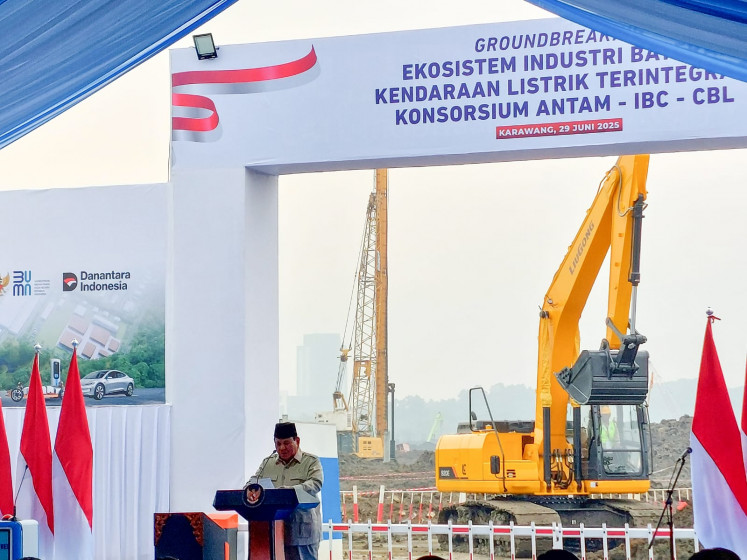Popular Reads
Top Results
Can't find what you're looking for?
View all search resultsPopular Reads
Top Results
Can't find what you're looking for?
View all search resultsOutgoing government launches controversial sea wall project
Giant sea wall: Workers arrange the groundbreaking site where steel pipes will be planted for the construction of a giant sea wall in Muara Baru, North Jakarta, on Thursday
Change text size
Gift Premium Articles
to Anyone

G
span class="caption">Giant sea wall: Workers arrange the groundbreaking site where steel pipes will be planted for the construction of a giant sea wall in Muara Baru, North Jakarta, on Thursday. JP/Ricky Yudhistira
In its last days in office, the central government has rushed to launch a controversial Giant Sea Wall (GSW) project off the capital's north coast.
On Thursday afternoon, the central government commenced the construction of the first phase of the National Capital Integrated Coastal Development (NCICD) program, popularly known as the GSW. The project will also include a reclamation project and the development of 17 artificial islets off the capital's north coast.
Coordinating Economic Minister Chairul Tanjung led the ceremony, with top officials, including Environment Minister Balthasar Kambuaya, Research and Technology Minister Gusti Muhammad Hatta, National Development Planning Minister Armida Alisjahbana, Maritime Affairs and Fisheries Minister Sharif Cicip Sutardjo, Public Works Deputy Minister Achmad Hermanto Dardak and Jakarta deputy governor for spatial planning Sarwo Handayani attending.
Dutch Ambassador to Indonesia Tjeerd de Zwaan, as well as representatives of developer companies, also attended the ceremony.
Chairul said during the ceremony at the Pluit pump house in North Jakarta that the groundbreaking marked the starting point for the long over-due project.
The first phase of the NCICD program comprises a 32-kilometer long embankment on the coast of Jakarta.
'One-fourth of the embankment will be funded by the government and city administration, while the remainder will be handled by the private sector,' he said, pointing out that the 8-kilometer part of the embankment would require funds of Rp 3.2 trillion (US$263 million).
Chairul said the central government and the city administration had targeted to complete their part of the project by the end of 2017. The embankment is designed to be 75 meters high, while the width of the surface planned to be 13.7 m.
The minister said the remaining parts of the embankment would be constructed by developers who won the concession of 17 planned islets, also part of the NCICD program.
The developers included city-owned property developer PT Jakarta Propertindo (Jakpro), city-owned PT Pembangunan Jaya Ancol and private developers PT Agung Podomoro Land's subsidiary PT Muara Wisesa Samudra, PT Intiland Development's subsidiary Taman Harapan Indah and PT Jaladri Kartika Ekapasi.
'They should also finish the project by the end of 2017,' he said, adding that the government might revoke their permits if they failed to meet the target.
The ground-breaking ceremony, however, was conducted in a hurry, according to a high-ranking official within the city administration.
'I was only told about the ceremony at the last minute,' North Jakarta Mayor Heru Budi Hartono told reporters at his office.
Heru also lamented the lack of coordination between the central government and his side.
'This project will affect around 50 residents living near the project site, but the minister never involved me in the meetings prior to the ceremony, whereas I am the one who will be responsible if there are relocations involved,' he said, adding, 'I am not sure the construction can start in the near future.'
The NCICD aims to restore flood safety and provide a sustainable future for the capital.
Ahmad Syafrudin of the Committee for the Phasing Out of Leaded Fuel (KPBB), however, said it was illegal.
'The project is against the law as it does not have a strategic environmental analysis and a regional analysis on environmental impact as required when a project involves more than one regional administration,' he said.









